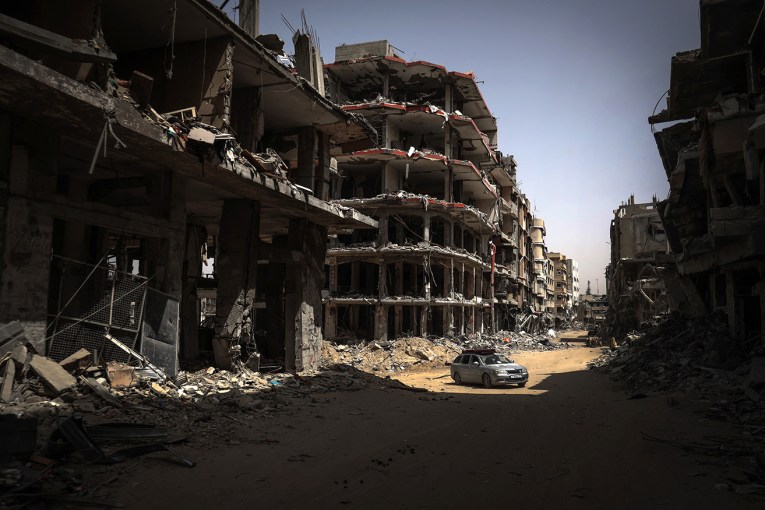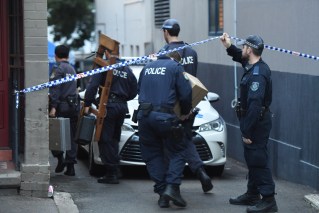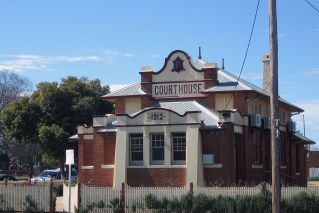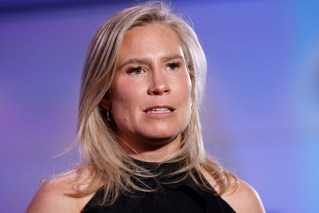- Warning: Graphic content
Russian soldiers have been caught on tape discussing tactics and tips for murdering Ukrainian civilians.
German intelligence teams gathered the evidence against occupying forces when they intercepted military radio, Der Spiegel magazine reports.
That report adds further weight to the accusations Russian soldiers have committed war crimes.
The New York Times cites an official saying that it was unclear whether the soldiers had been specifically referring to attacks on Bucha, north of the capital, where hundreds of people were executed – some with their hands tied behind their backs – and women were sexually abused.
But Der Spiegel magazine said some of the intercepts tracked by Germany’s BND intelligence agency appeared to match the locations of the bodies found this week.
Intercepted conversations included one of a Russian telling another about shooting someone on a bicycle.

This photograph out of a cyclist killed in Bucha shocked the world. Photo: Getty
“Rather, say sources familiar with the audio, the material suggests that the troops spoke of the atrocities as though they were simply discussing their everyday lives.
“That, say sources familiar with the audio, indicates that the murder of civilians has become a standard element of Russian military activity, potentially even part of a broader strategy.”
The report continued: “The intention is that of spreading fear among the civilian population and thus reducing the will to resist.”
Russia has repeatedly denied killing civilians. UN Ambassador Vassily Nebenzia said that while Bucha was under Russian control “not a single civilian suffered from any kind of violence.”
Read on for more of the latest news on the invasion of Ukraine – and the West’s response.
Russia suspended from UN Human Rights Council
The United Nations General Assembly has suspended Russia from the UN Human Rights Council over reports of “gross and systematic violations and abuses of human rights” by invading Russian troops in Ukraine.
The US-led push garnered 93 votes in favour, while 24 countries voted no and 58 countries abstained. A two-thirds majority of voting members – abstentions do not count – was needed to suspend Russia from the 47-member council.
Suspensions are rare. Libya was suspended in 2011 because of violence against protesters by forces loyal to then-leader Muammar Gaddafi.
The resolution adopted by the 193-member General Assembly draft expresses “grave concern at the ongoing human rights and humanitarian crisis in Ukraine,” particularly at reports of rights abuses by Russia.
Russia had warned countries that a yes vote or abstention will be viewed as an “unfriendly gesture” with consequences for bilateral ties, according to a note seen by Reuters.
Russia was in its second year of a three-year term on the Geneva-based council, which cannot make legally binding decisions. Its decisions send important political messages, however, and it can authorise investigations.
Moscow is one of the most vocal members on the council and its suspension bars it from speaking and voting, officials say, although its diplomats could still attend debates.
“They would probably still try to influence the Council through proxies,” said a Geneva-based diplomat.
Last month the council opened an investigation into allegations of rights violations, including possible war crimes, in Ukraine since Russia’s attack.
Tweet from @UN_News_RU
Since Russia’s invasion of Ukraine began on February 24, the General Assembly has adopted two resolutions denouncing Russia with 141 and 140 votes in favour. Moscow says it is carrying out a “special operation” to demilitarise Ukraine.
The US announced it would seek Russia’s suspension after Ukraine accused Russian troops of killing hundreds of civilians in the town of Bucha.
Russia denies attacking civilians in Ukraine.
Australia backs sanctions
Foreign Minister Marise Payne says concern for Australians in Russia – which faces further sanctions – is one of the reasons why the country’s ambassador hasn’t been expelled.
Senator Payne is in Brussels to meet with ministerial counterparts from other NATO countries and allies to discuss Russia’s ongoing military assault against Ukraine.
While there, she announced a further 67 Russian elites have been targeted with sanctions over the war.
But she won’t go so far as expelling the ambassador.
Senator Payne said she and senior DFAT officials had “consistently conveyed” their views to Russian ambassador Alexey Pavlovsky over his country’s invasion.
“It’s important to realise that … having a diplomatic path to discuss these issues can be very important,” she told 2GB.
“I’m also conscious that there are hundreds and hundreds of Australians in Russia, many of whom will potentially reach out to our embassy for consular support.”
Labor has urged the government to expel all Russian diplomats, barring the ambassador, to hold the Kremlin accountable for reported atrocities.
“It is hard to conceive how the decision can be made to allow these individuals to stay, given the sickening abuses being carried out by Russian forces,” Labor leader Anthony Albanese said.
Senator Payne said it was a possibility Russian President Vladimir Putin would be tried as a war criminal, with a reference made to the International Criminal Court for the “horrific list” of atrocities.
Mass graves have been found, civilian shelters targeted by Russian shelling, and rape as a weapon of war has been reported by Ukrainian women.
“We have offered specialised Australian personnel to assist the court with those investigations … that is part of holding Russia to account,” the minister said.
“It is important that we prosecute this case as strongly as possible.
“Australia is a very clear and determined supporter of that.”
Ukrainian President Volodymyr Zelensky’s address to the Australian parliament last week was described by Senator Payne as “immensely powerful”.
“For someone who’s been in the Australian parliament for a long time, it was one of the most compelling and moving presentations that I have had the honour to witness,” she said.

Volodymyr Zelensky addresses Australian Parliament via video link. Photo: AAP
Senator Payne said the coordination of free nations around the world in response to Russia’s aggression gave them strength to push back against “extraordinary acts of authoritarian states”.
Australia’s sanctions have extended to Russian military official Colonel-General Mikhail Mizintsev, who has been labelled the “Butcher of Mariupol” for attacks in the city that targeted buildings sheltering civilians.
Russian Deputy Prime Minister Dmitry Grigorenko has also been sanctioned, along with other senior Russian officials.
There are now more than 600 people who have been sanctioned following Russia’s invasion of Ukraine.
Peace deal ‘unacceptable’
Russian Foreign Minister Sergei Lavrov said Ukraine had presented Moscow with a draft peace deal containing unacceptable elements at variance with a previous agreement, comments that Kyiv dismissed as “pure propaganda”.
The Kremlin has said talks with Ukraine are not progressing as rapidly as it would like, and has accused the West of trying to derail negotiations by raising war crimes allegations against Russian troops in Ukraine, which Moscow denies.
Mr Lavrov said on Thursday that Ukraine had presented a draft agreement on Wednesday that deviated from proposals both sides’ negotiators had agreed on.
Ukraine’s new draft, according to Mr Lavrov, said the status of Crimea, which Moscow annexed from Ukraine in 2014, should be raised at a meeting between the two countries’ presidents.
It also said Ukraine could hold military drills with foreign countries without receiving Russia’s permission, something Moscow disagrees with.
“Such inability to agree once again highlights Kyiv’s true intentions, its position of drawing out and even undermining the talks by moving away from the understandings reached,” Mr Lavrov said, adding that the proposals were “unacceptable”.
Kyiv says it is committed to the talks but is not willing to give up its sovereignty and territorial integrity.
Presidential adviser Mykhaylo Podolyak, one of Ukraine’s negotiators, said Mr Lavrov’s comments should be seen as a tactic to undermine Ukraine or divert attention from war crime accusations against Russian troops.
“To make any changes to our position to weaken it would be pointless,” he said in written comments to Reuters.
“Mr Lavrov is not directly related to the negotiation process, and so his statements are pure propaganda.”
Mr Lavrov said Russia was now keen to continue with the talks and secure its own demands.
“Despite all the provocations, the Russian delegation will continue with the negotiation process, pressing for our own draft agreement that clearly and fully outlines our initial and key positions and requirements,” he said.
-with AAP









